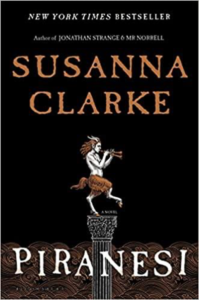
Piranesi
By Susanna Clarke
272 pages
Published September 15, 2020 by Bloomsbury Publishing
I was surprised by how much I liked Piranesi, considering that it is a genre book, fantasy fiction, which I rarely read and even more rarely enjoy. But this one worked. On several levels.
First and most importantly, it has a very simple plot that is based on a simple question: What is Piranesi, the protagonist, doing in this strange place and why? The author, Susanna Clarke, dishes out hints, but sparsely. And there is no great moment of anagnorisis. Not even a denouement, so to speak. And yet, it’s a page turner.
Its themes are expressed as existential and ontological questions that are not so much posed as suggested. And the answers, if you can call them answers, are ambiguous.
But neither the thinness of plot nor the vagueness of thought diminished my enjoyment of the book. I’m trying to figure out why that is.
One reason is the language. The diction is poetic without ornamentation – a kind of restrained prose that makes the many visual descriptions of the castle and its labyrinth come to life. There is a pleasure in reading them that equals what you might get from a James Cameron movie or a Hieronymus Bosch painting.
Several of our book club members had “trouble getting into the first few chapters.” I didn’t experience that – but with the book’s emphasis on prose and imagery, I can understand why they might have. But everyone that persevered (all but one) rated it one of our best books of the year.
From New York Magazine: “Piranesi Will Wreck You: The novel establishes Susanna Clarke as one of our greatest living writers.”
From BookPage: “Almost impossible to put down… lavishly descriptive, charming, heartbreaking, and imbued with a magic that will be familiar to Clarke’s devoted readers, Piranesi will satisfy lovers of Jonathan Strange and win her many new fans.”
From Time Magazine: “Nobody writes about magic the way Clarke does…. She writes about magic as if she’s actually worked it.”
 MarkFord
MarkFord